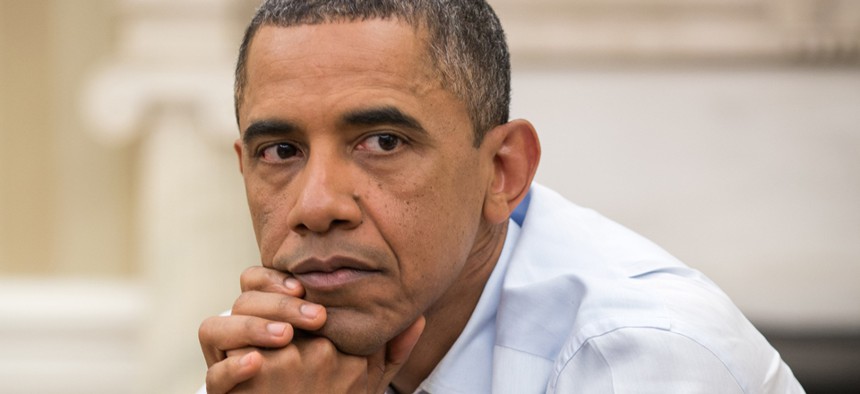
Pete Souza/White House file photo
2015 Will Be a Year of Reaction for the President
Obama will be shifting from playing offense to defense as Republicans assume control of Congress. His progressive accomplishments are at stake.
President Obama began last year vowing to use his pen to get things done. He opens this one pledging to wield it to stop legislation in its tracks.
The difference is the new Republican Congress. It throws the president, for his final two years in office, into the role of a goalie trying to preserve his squad's hold on the game. If the GOP can bridge its internal fissures—no small task—Obama may see a steady stream of unpalatable bills pertaining to energy, health care, education, immigration, and, of course, the federal budget.
At its heart, the coming year may well be defined as a struggle between a president trying to safeguard his progressive accomplishments and newly empowered conservatives determined to undermine them. "I'm going to defend gains that we've made in health care; I'm going to defend gains that we've made on environment and clean air and clean water," Obama said in an interview with NPR that aired over the holidays. Both sides hope to use the battle for their own political purposes, further worsening the odds of compromise.
Republicans will likely do their best to target areas of the Affordable Care Act to weaken, and will try to defang regulations being developed by the Environmental Protection Agency to limit carbon emissions from coal-fired power plants and other sources.
Even so, the White House hasn't given up hope of working with the new leadership on Capitol Hill on issues such as corporate tax reform, infrastructure funding, and trade. But given the level of anger among conservatives over Obama's executive action easing deportations, cooperation may come at a premium—and perhaps carry a price.
The president's first test may well come on legislation green-lighting construction of the Keystone XL pipeline, a priority for the new Congress. Obama has been signaling for weeks now that he's unlikely to support the project, which would transport Canadian oil to the Gulf of Mexico, because of environmental concerns. Tumbling gas prices and an improving economy have weakened the public case for the pipeline, but that won't deter Republicans who argue the project would create jobs and help cement America's new role as a global energy-production titan.
In the near term, too, Obama will face attempts to roll back his immigration order, which could shield as many as 5 million undocumented aliens from deportation. Those efforts may well be tied to the budget for the Department of Homeland Security, which is funded only through the end of February. The budget overall will be a major source of friction between the administration and the Hill. The president's proposal is due at the beginning of next month.
Perhaps a more pressing concern, though, lies in another potential fracas over the federal debt ceiling. Republicans are likely to demand spending cuts in exchange for an extension of the government's borrowing authority, which expires March 15.
One immediate goal for the White House will be seeing that two high-profile nominees, Ashton Carter at the Pentagon and Loretta Lynch at the Justice Department, are confirmed. While both already enjoy some support from Republicans, Carter's hearing will likely serve as a vehicle for GOP skepticism about the fight against the forces of the Islamic State in Iraq and Syria, while Lynch, potentially the next attorney general, will likely be peppered with questions about the executive order on immigration. Both nominees, however, can get through with just a bare majority in the Senate, meaning that the administration will need just a handful of Republicans to break ranks.
Along with the nomination of Carter as Defense secretary, the new Congress will be considering whether to pass a formal authorization of the U.S. campaign against the Islamic State—and whether in doing so to attempt to limit the duration of the fight or the use of ground troops in the region. The White House opposes both restrictions.
Republicans will also be pressed by urban Democrats such as Sens. Harry Reid of Nevada and Chuck Schumer of New York as well as the insurance industry to quickly reauthorize the Terrorism Risk Insurance Act, which provides a federal safety net for the industry in the event of a terror attack. Obama would likely sign such a bill providing it comes without unwelcome riders.
Beyond the early business, the mammoth shadow hanging over Obama is the Supreme Court's pending decision in a case that could do away with the federal tax subsidies that help consumers purchase health insurances in the 36 states that declined to set up their own online exchanges. The case will be argued in March and likely decided in June, at the end of the Court's term. A ruling against the administration could blow a hole in the ACA's framework, making it more difficult or impossible for millions of Americans to comply with the law's personal insurance mandate.
The problem for the White House is that there could be little capacity on the Hill to go in and fix the law if the Court's conservative majority breaks it (particularly with a presidential election on the horizon)—even if Republican leaders are fearful of the blowback that would result. It could be the rare result that damages both the president and his opponents.
But these days, Obama can only worry about what he can control. And as his final act as president opens, that's less and less than ever.







